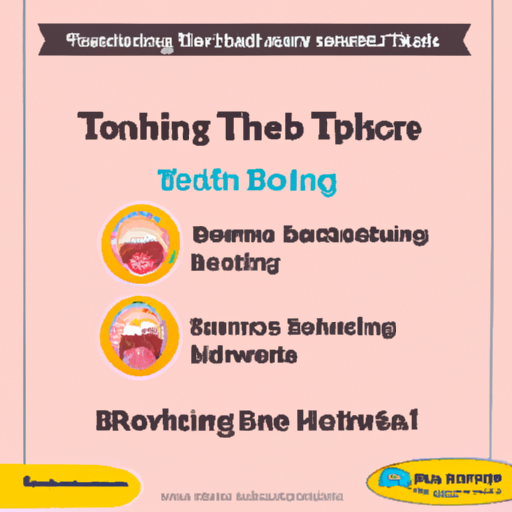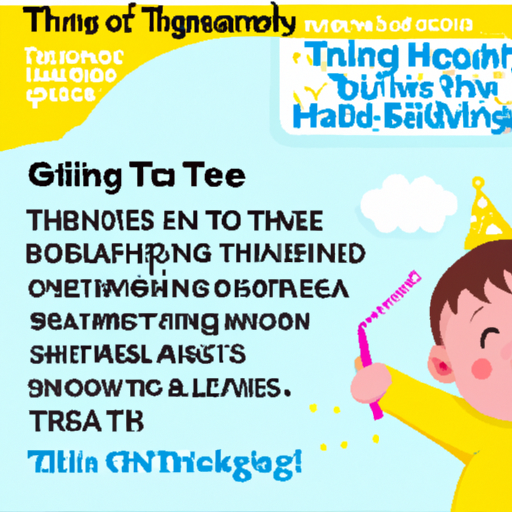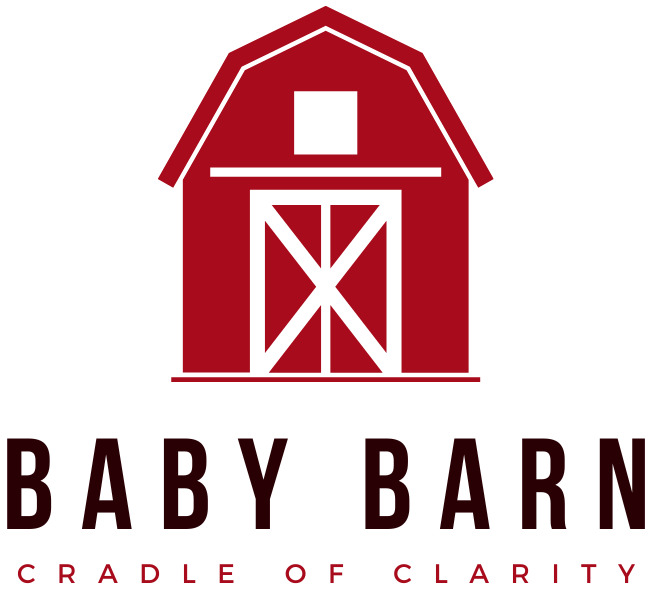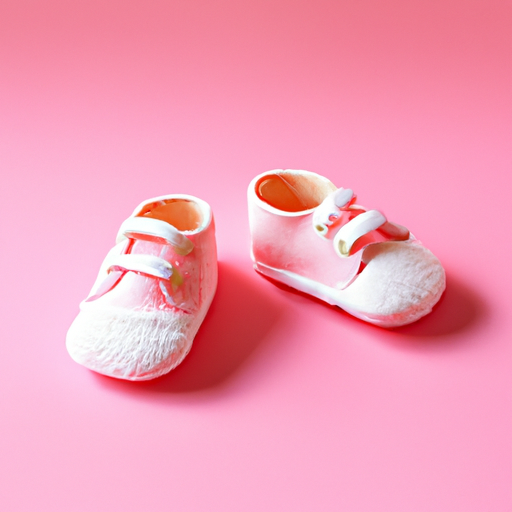Are you eagerly awaiting the moment when your little one starts teething? Well, you’re in luck because in this article, we’ll explore all the details about when your baby is likely to start teething. We understand that every baby is different, but we’ll provide you with a general timeline and some signs to look out for. So, if you’re curious about when those first little teeth are going to make an appearance, keep reading!
Curious to know more about this exciting milestone in your baby’s development? In the upcoming article, we’ll dive deeper into the teething process and discuss the average age when babies start teething. We’ll also explore the common signs of early teething, such as increased drooling and irritability, as well as share some tips on how to alleviate your baby’s discomfort during this time. So, if you want to be prepared for the teething journey ahead, stay tuned for more information in the next section! Teething is an exciting milestone in your baby’s development, but it can also come with its fair share of challenges. As a parent, it’s important to understand the teething process, know what signs to look out for, and learn how to soothe your baby’s discomfort. In this article, we will explore the stages of teething, common symptoms, ways to alleviate pain, oral hygiene tips, and when to consult a pediatrician.
What is teething?
Teething refers to the eruption of your baby’s first teeth through their gums. It is a natural process that begins around the age of 6 months and continues until the age of 2 or 3. During this time, your baby’s primary teeth, also known as baby teeth or milk teeth, will gradually emerge, allowing them to chew their food and support the development of their jaw and facial structure.
Definition of teething
Teething is the process by which your baby’s teeth break through their gums, leading to the appearance of their first set of teeth.
Signs and symptoms of teething
While every baby is different, there are some common signs and symptoms to watch out for during the teething process. These may include:
- Increased drooling: Your baby may produce more saliva than usual, leading to excessive drooling. This can cause skin irritation around the mouth and chin.
- Gum swelling and tenderness: As the teeth begin to push through the gums, you may notice redness, swelling, and sensitivity in the affected area. This can make your baby’s gums appear puffy and sore.
- Irritability and restlessness: Teething can be uncomfortable for your baby, leading to irritability, fussiness, and difficulty sleeping. They may also exhibit clinginess and want to be held more often.
- Changes in eating and sleeping patterns: The discomfort of teething can affect your baby’s appetite and sleep routine. They may show a decreased interest in eating or experience trouble falling asleep or staying asleep.
- Mild fever or diarrhea: Some babies may develop a slight increase in body temperature or experience mild digestive upset during teething. However, it’s important to note that these symptoms are not directly caused by teething and should be monitored closely.

When does teething typically begin?
The age at which babies start teething can vary. While the average age for teething to begin is around 6 months, it is not uncommon for some babies to start as early as 3 months or as late as 12 months.
Age range for teething to start
Teething can begin as early as 3 months and continue until the age of 12 to 14 months. However, most babies usually start teething between 6 and 9 months of age.
Factors that influence the timing of teething
Several factors can influence when your baby’s teeth will start to come in. These factors include:
- Genetics: The timing of teething can be influenced by hereditary factors. If you or your partner started teething early or late, there is a higher chance that your baby will follow a similar pattern.
- Gender: Girls typically begin teething earlier than boys, although the time difference is usually minimal.
- Premature birth: Babies who are born prematurely may start teething later than full-term babies.
- Overall development: Every baby develops at their own pace, so the timing of teething can vary.
The teething process
Teething occurs in stages, with each stage marked by the eruption of certain teeth. The process usually begins with the lower central incisors, followed by the upper central incisors and then the lateral incisors. The first set of molars, canines, and second set of molars will follow in due time.
Stages of teething
- Stage 1: The lower central incisors are typically the first to erupt, usually around 6 to 10 months of age. These are the two bottom front teeth.
- Stage 2: The upper central incisors usually come in next, between 8 to 12 months. These are the two top front teeth.
- Stage 3: The upper and lower lateral incisors, located next to the central incisors, erupt around 9 to 16 months.
- Stage 4: The first set of molars, also known as the ‘baby molars’, usually appear between 13 to 19 months. These are the larger teeth at the back of the mouth.
- Stage 5: The canines, or ‘eye teeth’, typically erupt around 16 to 23 months. These are located on either side of the incisors.
- Stage 6: The second set of molars, which are positioned behind the first set of molars, typically appear between 23 to 33 months.
Order in which baby teeth erupt
The order in which baby teeth erupt follows a general pattern. However, it’s important to remember that each child is unique, and there can be variations in the order and timing of tooth eruption:
- Lower central incisors
- Upper central incisors
- Lower lateral incisors
- Upper lateral incisors
- First molars
- Canines
- Second molars
Timeline for teething process
The teething process can span over several months, varying from child to child. On average, it takes about two years for your baby to acquire a complete set of primary teeth.
Common teething symptoms
Teething can be an uncomfortable experience for your baby, often accompanied by various symptoms. While these symptoms are usually temporary and harmless, they can cause distress for both you and your little one.
Pain and discomfort
Teething can cause mild to moderate pain and discomfort as the teeth push through the gums. Your baby may express their discomfort through increased fussiness, crying, and irritability.
Excessive drooling
Excessive drooling is a common symptom of teething and can often lead to skin irritation around the mouth and chin. Keep a soft cloth or bib handy to wipe away the excess saliva and prevent skin irritation.
Gum swelling and tenderness
During the teething process, your baby’s gums may become swollen, red, and tender. You may notice a small white blister-like bump on the gum surface, indicating that a tooth is about to erupt.
Irritability and restlessness
Teething discomfort can make your baby fussy, irritable, and restless, especially during feeding and sleep times. They may require additional comfort and reassurance during this challenging time.
Changes in eating and sleeping patterns
The pain and discomfort associated with teething can cause changes in your baby’s eating and sleeping patterns. They may have a decreased appetite or difficulty latching during breastfeeding. Additionally, your baby’s sleep may be disrupted due to discomfort, leading to frequent waking during the night.
Mild fever or diarrhea
Some babies may experience a slight increase in body temperature or mild digestive upset during teething. However, it’s important to remember that these symptoms are not directly caused by teething and should be closely monitored.

Ways to soothe teething pain
Fortunately, there are several strategies you can implement to help soothe your baby’s teething discomfort and make the process more manageable for both of you.
Chilled teething toys
Chilling teething toys in the refrigerator can provide relief to your baby’s sore gums. The cold sensation helps numb the area, reducing inflammation and pain. Choose teething toys specifically designed for this purpose and ensure they are safe for your baby to chew on.
Gently massaging the gums
Using clean fingers or a clean, damp cloth, you can gently massage your baby’s gums to relieve discomfort. Apply light pressure in circular motions around the affected area to soothe swollen gums. Be sure to wash your hands thoroughly beforehand to maintain cleanliness.
Cold washcloth
A cold damp washcloth can be an effective and inexpensive teething remedy. Simply wet a clean washcloth with cold water, ring out any excess moisture, and place it in the refrigerator for a short period. Once chilled, give it to your baby to chew on, providing relief to their tender gums.
Teething gels or medications (if recommended by a pediatrician)
There are teething gels and over-the-counter medications available that can help alleviate teething pain. However, it’s important to consult with your pediatrician before using any medications on your baby. They can offer guidance on safe options and appropriate dosages.
What to expect during teething
While teething is a natural and normal part of your baby’s development, it’s essential to be aware of potential complications that may arise.
Potential complications during teething
In general, teething is a straightforward process. However, some babies may experience complications such as:
- Teething rash: Excessive drooling can lead to a rash or irritation around your baby’s mouth and chin. Keep the area clean and dry, and apply a gentle barrier cream to protect their skin.
- Biting and gnawing: To help relieve the pressure and pain, your baby may resort to biting and gnawing on objects, including their own fingers. Provide safe and appropriate teething toys to redirect their chewing behavior.
- Disrupted sleep: Teething discomfort can disrupt your baby’s sleep patterns, leading to more frequent waking during the night. Provide comfort and reassurance during these times, and establish a calming bedtime routine to aid better sleep.
Caring for your baby’s teeth during teething
Even though your baby’s teeth have not fully erupted, it is still important to care for their oral health. Gently wipe your baby’s gums with a clean, damp cloth after feedings, removing any milk residue or debris. This helps prevent oral infections and keeps the gums clean and healthy.
Regular dental check-ups
As soon as your baby’s first tooth appears, it’s a good idea to schedule their first dental visit. The American Academy of Pediatric Dentistry recommends that children should have their first dental check-up no later than their first birthday. Regular dental check-ups allow your dentist to monitor your baby’s oral health and provide guidance on proper care as their teeth continue to emerge.

Teething myths and misconceptions
With teething being a widely discussed topic among parents, it’s common for myths and misconceptions to circulate. Let’s debunk some of the popular myths and set the record straight.
Popular myths about teething
- Teething causes severe fever: While a mild increase in body temperature can occur during teething, high fever is not directly caused by teething. If your baby has a persistent high fever, it’s essential to consult their pediatrician.
- Teething leads to diarrhea: Mild digestive upset, including loose stools, can occasionally occur during teething. However, teething alone does not cause diarrhea. If your baby experiences persistent diarrhea or vomiting, seek medical advice.
- All teething symptoms are severe: Every baby experiences teething differently. Some babies may only exhibit mild symptoms, while others may experience more significant discomfort. It’s important to monitor your baby’s symptoms and seek medical advice if you have concerns.
Dispelling common misconceptions
- Teething causes developmental delays: Teething is a normal developmental milestone and does not cause delays in other areas of your baby’s development, such as crawling, walking, or talking.
- Teething lasts for a short time: The teething process can span over a year, with each tooth taking its own time to erupt. It’s important to be patient and provide support to your baby throughout this period.
- All babies follow the same teething timeline: Every baby is unique, and the teething process can vary from child to child. Some babies may get their teeth earlier or later than others, and that is perfectly normal.
When to consult a pediatrician
While teething is generally a normal and harmless process, there are instances when it’s crucial to seek guidance from a pediatrician.
Persistent high fever
If your baby has a persistent high fever (above 100.4°F or 38°C), it may be a sign of an unrelated illness or infection. Contact your pediatrician for evaluation and appropriate medical care.
Excessive vomiting or diarrhea
While mild digestive upset can occur during teething, persistent vomiting or diarrhea should not be attributed solely to teething. These symptoms may indicate another underlying issue that requires medical attention.
Unusual rash or other concerning symptoms
If your baby develops an unusual rash, particularly around the mouth and chin, or exhibits any other concerning symptoms that you believe may be related to teething, consult your pediatrician. They can assess the situation and provide appropriate guidance.
Tips for maintaining good oral hygiene
Good oral hygiene practices are essential for your baby’s overall health and the development of a strong and healthy smile. Here are some tips to help you maintain good oral hygiene for your little one:
Introducing toothbrush and toothpaste
As soon as your baby’s first tooth erupts, it’s time to introduce a toothbrush specially designed for infants. Use a small, soft-bristled toothbrush to gently brush their teeth twice a day. Begin with just a smear of fluoridated toothpaste, roughly the size of a grain of rice. Gradually increase the amount of toothpaste to a pea-sized portion as your child grows.
Establishing a brushing routine
Establishing a consistent brushing routine is essential for your baby’s oral health. Make brushing your baby’s teeth a fun and interactive activity. Choose a specific time of day, such as after breakfast and before bedtime, to create a habit. Brush gently in small, circular motions, paying attention to all surfaces of the teeth and gums.
Importance of a balanced diet
A balanced diet plays a crucial role in supporting your baby’s oral health. Provide them with a variety of nutritious foods, including fruits, vegetables, whole grains, and lean proteins. Limit sugary snacks and beverages, as excessive sugar consumption can contribute to tooth decay.
Limiting sugar intake
Sugar is a leading cause of tooth decay in children. Limit your baby’s exposure to sugary foods and drinks, such as soda, juice, candy, and sweetened snacks. Opt for water or milk as the main drinks and offer healthy snacks like fresh fruits and vegetables.
Regular visits to the dentist
Regular dental check-ups are essential for monitoring your baby’s oral health and catching any potential issues early on. Schedule regular visits to a pediatric dentist who specializes in children’s dental care. The dentist can provide guidance on oral care, offer preventive treatments like fluoride varnish, and monitor your baby’s teeth as they continue to develop.
Conclusion
The teething process is an exciting time as your baby progresses through the stages of tooth eruption. While it can be challenging at times due to the discomfort your baby may experience, understanding the signs of teething, implementing appropriate soothing techniques, and maintaining good oral hygiene can help you and your baby navigate this milestone with ease.
Remember, each baby’s teething timeline is unique, and there is no need to compare your child’s progress to others. Trust the natural process and seek advice from your pediatrician whenever you have concerns or questions. With proper care and attention, you can support your baby’s dental health and ensure their beautiful smile starts off on the right foot. Enjoy this journey of your baby’s teething process and celebrate each tiny tooth that appears, marking another milestone in their growth.





